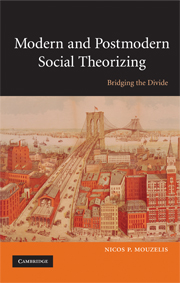Book contents
- Frontmatter
- Contents
- List of figures
- Acknowledgements
- Introduction
- Part I The theoretical background: the development of the agency–structure problematic
- Part II Parsonian and post-Parsonian developments
- 2 Parsons and the development of individual rights
- 3 Evolution and democracy: Parsons and the collapse of communism
- 4 Post-Parsonian theory I: neo-functionalism and beyond
- 5 Post-Parsonian theory II: beyond the normative and the utilitarian
- Part III Agency and structure: reworking some basic conceptual tools
- Part IV Bridges between modern and late/postmodern theorizing
- Part V Towards a non-essentialist holism
- Instead of Conclusion: Twelve rules for the construction of an open-ended holistic paradigm
- Appendix: In defence of ‘grand’ historical sociology
- References
- Index
4 - Post-Parsonian theory I: neo-functionalism and beyond
Published online by Cambridge University Press: 05 June 2012
- Frontmatter
- Contents
- List of figures
- Acknowledgements
- Introduction
- Part I The theoretical background: the development of the agency–structure problematic
- Part II Parsonian and post-Parsonian developments
- 2 Parsons and the development of individual rights
- 3 Evolution and democracy: Parsons and the collapse of communism
- 4 Post-Parsonian theory I: neo-functionalism and beyond
- 5 Post-Parsonian theory II: beyond the normative and the utilitarian
- Part III Agency and structure: reworking some basic conceptual tools
- Part IV Bridges between modern and late/postmodern theorizing
- Part V Towards a non-essentialist holism
- Instead of Conclusion: Twelve rules for the construction of an open-ended holistic paradigm
- Appendix: In defence of ‘grand’ historical sociology
- References
- Index
Summary
Introduction
In the previous two chapters I critically examined some of the strong and weak points of Parsons' functionalist-evolutionist theory and its relevance in understanding democratizing tendencies in the modern world. In the following two chapters I examine some of the writings of two theorists, Alexander and Joas, who, although taking Parsons' work seriously, try to restructure it in an attempt to resolve some of its more problematic aspects.
If Parsons is the father of sociological theory, Jeffrey Alexander in the United States and Anthony Giddens in Britain are his main heirs presumptive. Like Parsons, they both try to create a set of concepts to help raise interesting sociological questions and investigate the social world in a non-empiricist, theoretically rigorous manner.
Giddens' theorizing is quite as ‘grand’ as Parsons'. His aim, at least in his more theoretically orientated work (1984), is to provide a fully worked-out post-Parsonian armoury of concepts, with the help of which we can conceptualize sociologically major dimensions of social life (such as power or trust), compare different types of social systems, and establish logically coherent linkages between different levels of analysis and different ways of viewing the social.
Alexander's theorizing, without being any less significant, is less ‘grand’ in two senses. For one thing, he tries to retain, in more or less restructured form, some major components of the Parsonian edifice, and for another he offers us, on a more modest scale, a set of ‘tactical’ concepts that attempt to bring Parsonian functionalism and the various theoretical reactions to, or critiques of, Parsons that developed from the 1960s onwards closer together.
- Type
- Chapter
- Information
- Modern and Postmodern Social TheorizingBridging the Divide, pp. 65 - 85Publisher: Cambridge University PressPrint publication year: 2008



